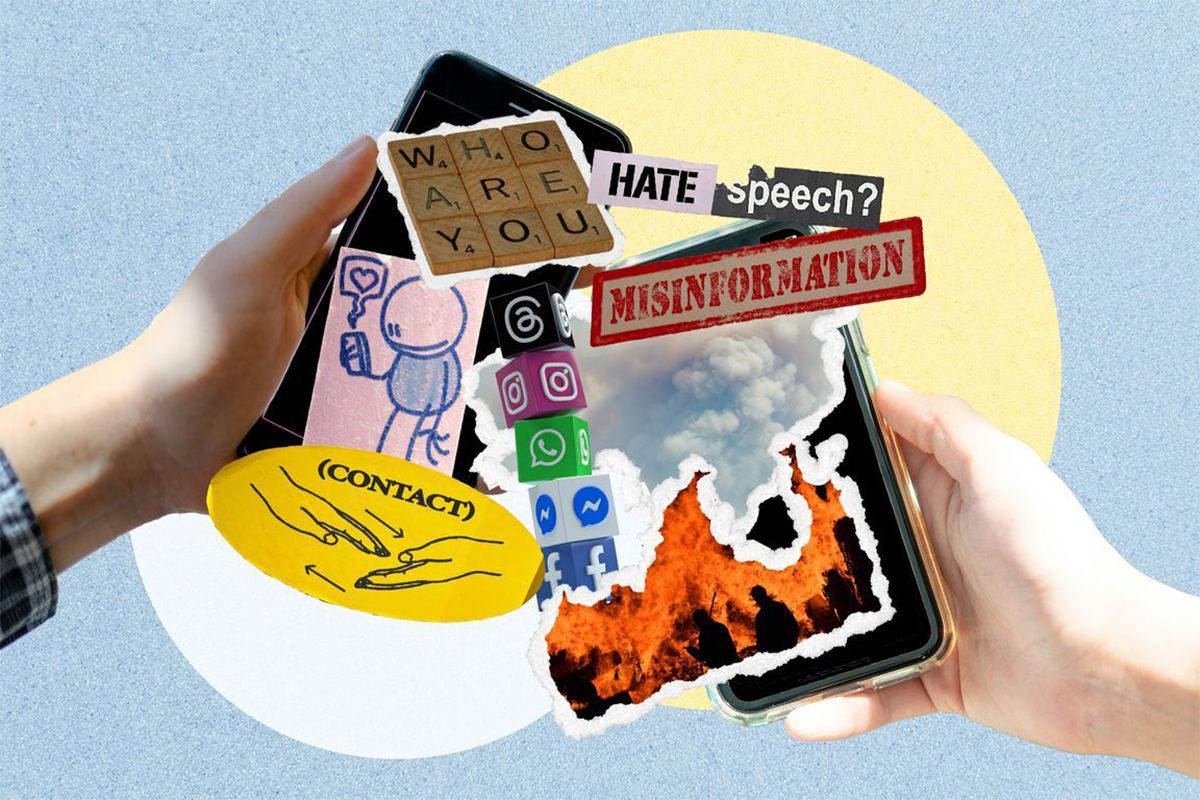Seeing others as fully human: Initiative to Study Hate

By Lucy Berbeo and Citlalli Chávez-Nava | Art by Katie Sipek | September 29, 2025
In 2021, amid the COVID-19 pandemic, rising global political tensions and a corrosive atmosphere on social media, Myers participated in talks with then-Chancellor Gene Block about what the university might do to help address the alarming rise in hateful speech and action across the U.S. The Initiative to Study Hate, or ISH, spearheaded by Myers and backed by an anonymous donation of $3 million, launched as a three-year pilot effort, with Ferdman joining as project manager and Amalia Mora, a fellow UCLA alumna, joining as research manager.
Since then, ISH has assembled a research community of more than 115 scholars, from undergraduates to advanced faculty, exploring issues as diverse as online hate speech and attitudes toward climate and war refugees. Ongoing impact symposiums showcase their work developing shared public resources, including a rapid-response toolkit to combat mis- and disinformation around the Los Angeles wildfires. At the initiative’s outset, Myers says, participants sought to understand hate, not as directed against one group or another but as a phenomenon that takes rise in both individuals and groups.
Howard Padwa, a health services and qualitative researcher with UCLA’s Integrated Substance Abuse Programs at the David Geffen School of Medicine and a social scientist who earned his Ph.D. in history at UCLA, played a key role in these early discussions. His research has included leading a team of public health scholars investigating the beliefs and fears that lead to discrimination and violence against people experiencing homelessness, as well as an ongoing project addressing hateful discourse on the social media platform X. The latter in particular, he says, highlights the importance of real-world interaction in combating the phenomenon of hate.
“It speaks to the fact that we need to get off our computers and phones and start interacting with one another — it’s much easier to hate someone you’ve never met, someone who you call ‘one of them,’ one of Group X, whatever that is,” Padwa says. “And one thing that’s striking is that the Group X that is very often hated isn’t necessarily a race, religion or ethnicity but a political orientation. In other words, this kind of polarization and hatred often seems to be targeted at people for what they believe versus who they are.
In 2023, ISH awarded 15 grants to researchers studying both antisemitism and Islamophobia in the U.S. and globally; the Islamophobia research hub is housed in ISH, while the antisemitism hub, supported by the Anthony Pritzker Family Foundation, is a collaboration between ISH and UCLA’s Alan D. Leve Center for Jewish Studies. One project, led by UCLA assistant professor of sociology Aliza Luft and assistant professor of political science Salma Mousa, studies misperceptions of “others” among UCLA students to understand better how misinformation, stereotyping and ideological sorting shape interpersonal attitudes and interactions on campus.
This work is especially timely, Luft says, in the wake of the campus tensions and violence that followed these global events. At a practical level, the team hopes the project results will inform efforts to foster deeper understanding among those who hold divergent positions, both at UCLA and at other universities, especially in moments of deep division or pain. The principles and practices of kindness overlap with this work; Luft and Mousa sit on the Bedari Kindness Institute’s faculty advisory committee, whose members help support and review research projects that align with the institute’s mission.
“Our research project is grounded in the belief that kindness isn’t just an individual trait — it’s also a social practice that can be encouraged or discouraged by the structures around us,” Luft says. “By identifying where students misperceive one another, and by testing low-cost, scalable interventions to correct those misperceptions, we’re trying to create the conditions under which empathy and respect across difference can become more possible. Kindness, in this sense, is about building the capacity to listen — and to see others as fully human — even when we disagree.”
Spirituality and self-care
Victor Narro, lecturer in labor studies and law and project director at the UCLA Labor Center, has taught a course called “Spirituality, Mindfulness, Self-care and Social Justice” since 2015. Students in the course participate in mindful breathing meditations, breakthrough conversations and meditative walks while learning about spiritual activist leaders such as Mohandas Gandhi, Thich Nhat Hanh, Martin Luther King Jr. and César Chávez. In 2022, the Bedari Kindness Institute funded a study that evaluated the impacts of the course on current and former students. Findings showed the class helped them deal with stress, anxiety and the demands of college life and improve their academic performance, daily relationships and work-life balance.
Narro, also known among activists, lawyers and outreach workers across Los Angeles as a self-care and spirituality evangelist, firmly believes that these practices should form part of UCLA’s academic mission.
“It is so rewarding when I run into students who have enrolled in this class and tell me about how they apply the course teachings in their daily lives and work,” Narro says. “I think academic life should also support students in the areas of self-development, self-growth, wellness and tapping into one’s inner wisdom, and that’s ultimately what this class aims to achieve.”
To return to the full feature, click here.



